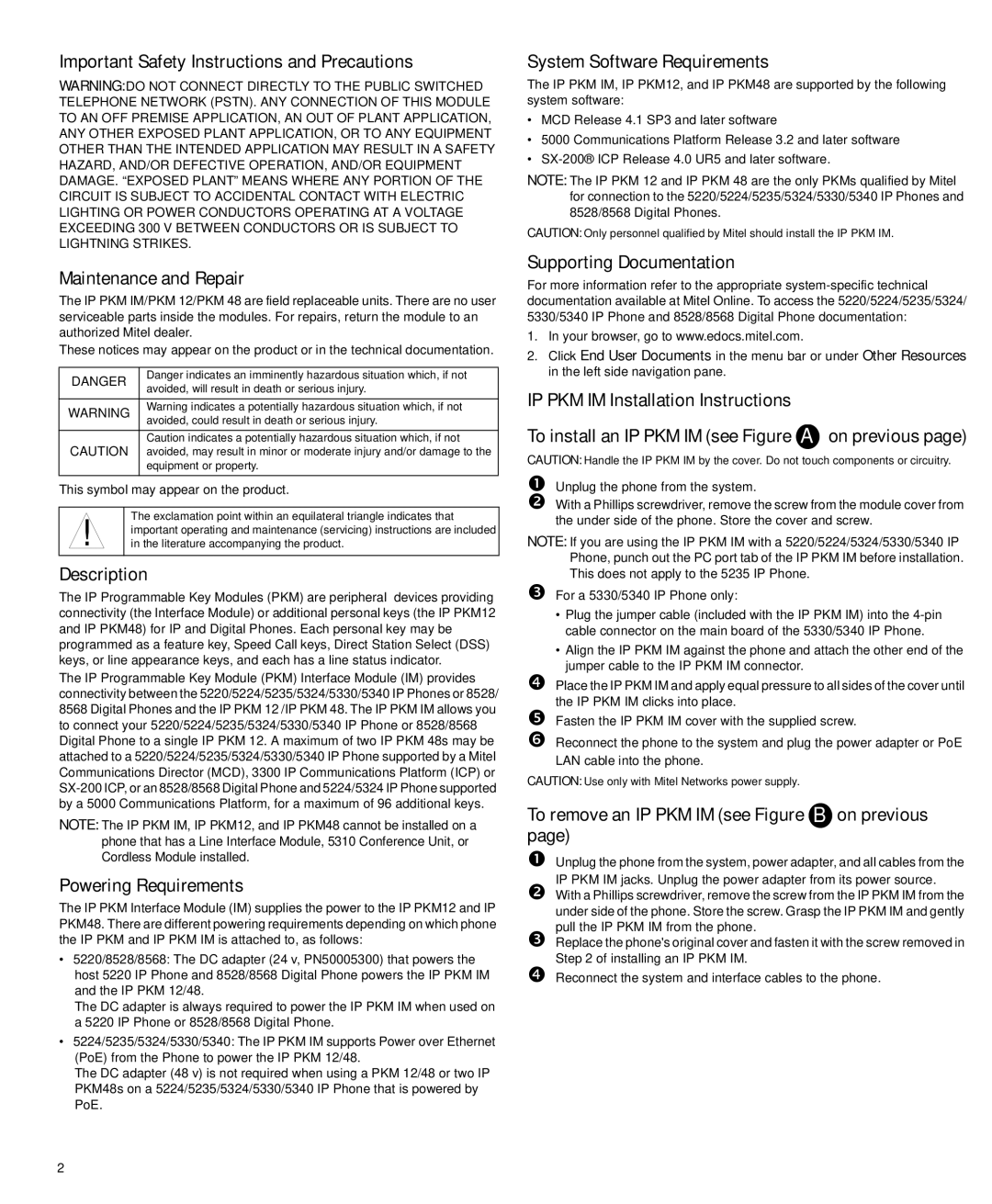
Important Safety Instructions and Precautions
WARNING:DO NOT CONNECT DIRECTLY TO THE PUBLIC SWITCHED TELEPHONE NETWORK (PSTN). ANY CONNECTION OF THIS MODULE TO AN OFF PREMISE APPLICATION, AN OUT OF PLANT APPLICATION, ANY OTHER EXPOSED PLANT APPLICATION, OR TO ANY EQUIPMENT OTHER THAN THE INTENDED APPLICATION MAY RESULT IN A SAFETY HAZARD, AND/OR DEFECTIVE OPERATION, AND/OR EQUIPMENT DAMAGE. “EXPOSED PLANT” MEANS WHERE ANY PORTION OF THE CIRCUIT IS SUBJECT TO ACCIDENTAL CONTACT WITH ELECTRIC LIGHTING OR POWER CONDUCTORS OPERATING AT A VOLTAGE EXCEEDING 300 V BETWEEN CONDUCTORS OR IS SUBJECT TO LIGHTNING STRIKES.
Maintenance and Repair
The IP PKM IM/PKM 12/PKM 48 are field replaceable units. There are no user serviceable parts inside the modules. For repairs, return the module to an authorized Mitel dealer.
These notices may appear on the product or in the technical documentation.
|
| |
DANGER | Danger indicates an imminently hazardous situation which, if not | |
avoided, will result in death or serious injury. | ||
| ||
WARNING | Warning indicates a potentially hazardous situation which, if not | |
avoided, could result in death or serious injury. | ||
| ||
CAUTION | Caution indicates a potentially hazardous situation which, if not | |
avoided, may result in minor or moderate injury and/or damage to the | ||
| equipment or property. |
This symbol may appear on the product.
The exclamation point within an equilateral triangle indicates that
! important operating and maintenance (servicing) instructions are included in the literature accompanying the product.
Description
The IP Programmable Key Modules (PKM) are peripheral devices providing connectivity (the Interface Module) or additional personal keys (the IP PKM12 and IP PKM48) for IP and Digital Phones. Each personal key may be programmed as a feature key, Speed Call keys, Direct Station Select (DSS) keys, or line appearance keys, and each has a line status indicator.
The IP Programmable Key Module (PKM) Interface Module (IM) provides connectivity between the 5220/5224/5235/5324/5330/5340 IP Phones or 8528/ 8568 Digital Phones and the IP PKM 12 /IP PKM 48. The IP PKM IM allows you to connect your 5220/5224/5235/5324/5330/5340 IP Phone or 8528/8568 Digital Phone to a single IP PKM 12. A maximum of two IP PKM 48s may be attached to a 5220/5224/5235/5324/5330/5340 IP Phone supported by a Mitel Communications Director (MCD), 3300 IP Communications Platform (ICP) or
NOTE: The IP PKM IM, IP PKM12, and IP PKM48 cannot be installed on a phone that has a Line Interface Module, 5310 Conference Unit, or Cordless Module installed.
Powering Requirements
The IP PKM Interface Module (IM) supplies the power to the IP PKM12 and IP PKM48. There are different powering requirements depending on which phone the IP PKM and IP PKM IM is attached to, as follows:
•5220/8528/8568: The DC adapter (24 v, PN50005300) that powers the host 5220 IP Phone and 8528/8568 Digital Phone powers the IP PKM IM and the IP PKM 12/48.
The DC adapter is always required to power the IP PKM IM when used on a 5220 IP Phone or 8528/8568 Digital Phone.
•5224/5235/5324/5330/5340: The IP PKM IM supports Power over Ethernet (PoE) from the Phone to power the IP PKM 12/48.
The DC adapter (48 v) is not required when using a PKM 12/48 or two IP PKM48s on a 5224/5235/5324/5330/5340 IP Phone that is powered by PoE.
System Software Requirements
The IP PKM IM, IP PKM12, and IP PKM48 are supported by the following system software:
•MCD Release 4.1 SP3 and later software
•5000 Communications Platform Release 3.2 and later software
•
NOTE: The IP PKM 12 and IP PKM 48 are the only PKMs qualified by Mitel for connection to the 5220/5224/5235/5324/5330/5340 IP Phones and 8528/8568 Digital Phones.
CAUTION: Only personnel qualified by Mitel should install the IP PKM IM.
Supporting Documentation
For more information refer to the appropriate
1.In your browser, go to www.edocs.mitel.com.
2.Click End User Documents in the menu bar or under Other Resources in the left side navigation pane.
IP PKM IM Installation Instructions
To install an IP PKM IM (see Figure A on previous page)
CAUTION: Handle the IP PKM IM by the cover. Do not touch components or circuitry.
Unplug the phone from the system.
With a Phillips screwdriver, remove the screw from the module cover from the under side of the phone. Store the cover and screw.
NOTE: If you are using the IP PKM IM with a 5220/5224/5324/5330/5340 IP Phone, punch out the PC port tab of the IP PKM IM before installation. This does not apply to the 5235 IP Phone.
For a 5330/5340 IP Phone only:
•Plug the jumper cable (included with the IP PKM IM) into the
•Align the IP PKM IM against the phone and attach the other end of the jumper cable to the IP PKM IM connector.
Place the IP PKM IM and apply equal pressure to all sides of the cover until the IP PKM IM clicks into place.
Fasten the IP PKM IM cover with the supplied screw.
Reconnect the phone to the system and plug the power adapter or PoE LAN cable into the phone.
CAUTION: Use only with Mitel Networks power supply.
To remove an IP PKM IM (see Figure B on previous page)
Unplug the phone from the system, power adapter, and all cables from the
IP PKM IM jacks. Unplug the power adapter from its power source.
With a Phillips screwdriver, remove the screw from the IP PKM IM from the
under side of the phone. Store the screw. Grasp the IP PKM IM and gently pull the IP PKM IM from the phone.
Replace the phone's original cover and fasten it with the screw removed in Step 2 of installing an IP PKM IM.
Reconnect the system and interface cables to the phone.
2
